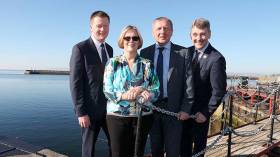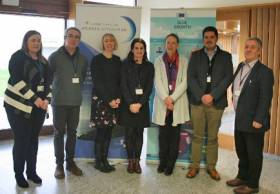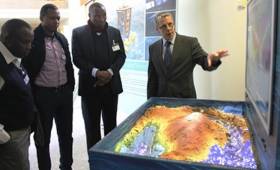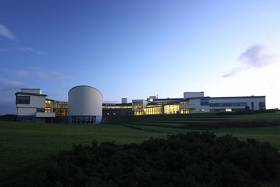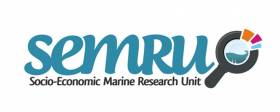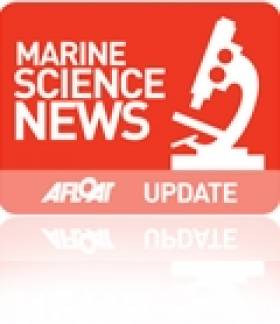Displaying items by tag: Blue Growth
#OurOceanWeath - Employment growth of more than 16% in the marine sector was among the encouraging statistics cited by Marine Minister Michael Creed in his address to the Our Ocean Wealth Summit, which opened at Galway Docks yesterday (Thursday 28 June).
“Ireland has taken important strides in recent years in developing our blue economy. This is being driven at the highest levels of Government and represents a unique and joined up approach to growing Ireland’s blue economy.
“The work of our cross Departmental high level Marine Co-ordination Group (MCG), which I chair, will continue as we seek to build on recent success,” Minister Creed said.
Updated statistics indicate that the direct economic value of Ireland’s ocean economy now stands at €2 billion, or approximately 1% of GDP, which represents a 21% increase on 2015 figures.
“The 2017 estimates suggest that our ‘blue economy’ continues to grow at a faster pace than the general economy,” the minister added. “Growth in 2017 is being driven by strong performances in the aquaculture, sea fisheries, shipping and marine tourism industries as well as continued growth in the emerging ocean industries.
“A really encouraging statistic is the growth in employment for the marine sector which has risen from 27,888 (FTEs) in 2015 to an estimated 32,509 (FTEs) in 2017, an increase of 16.6%.”
Minister Creed also announced the publication of the latest annual Progress Report on Ireland’s Integrated Marine Plan - Harnessing Our Ocean Wealth.
“This report which covers inputs from across state departments and agencies, provides a wealth of information, spanning governance, research, education, international co-operation, business development, sustainability, and protection and conservation of marine ecosystems,” he said.
The Our Ocean Wealth Summit, now in its fifth year, forms a key part of the Government's integrated plan for Ireland’s marine sector and brings together national and international expert speakers, industry leaders, business development agencies and the Irish business and marine research community. This year’s discussions focused on the overall theme of ‘Investing in Marine Ireland’.
Ahead of the summit, PwC and the Marine Institute released the results of a joint survey of leading voices in Ireland’s maritime industry, which revealed “overwhelming confidence in Ireland’s maritime sector in spite of challenges posed by Brexit”.
Other findings include the potential of offshore wind and ocean energy, which is seen as a key opportunity for the marine sector, while overall, maritime leaders believe further investment in the marine industry is critical.
The Our Ocean Wealth Summit is part of a range of industry and innovation events taking place in Galway as part of SeaFest 2018, Ireland's national maritime festival, which opens today (Friday 29 June). A wide range of public events are taking place in Galway Harbour and Docks and the city over the weekend till Sunday 1 July.
Among them will be Life and the Sea, a special civic and military commemorative event to remember all those who have lost their lives at sea, and recognising the heroism of the men and women of our rescue services.
Mayor of Galway City, Niall McNelis, will address the special commemoration which will take place at 6pm on board the LÉ William Butler Yeats in Galway Harbour.
There will be musical performances, while poems will be read by Tony Hiney, community fundraising manager of the Western Region of the RNLI, and Lt Cdr David Fleming, Officer Commanding of the LÉ William Butler Yeats.
Minister of State Seán Kyne, accompanied by Mayor McNelis, and RNLI, Irish Coast Guard, Naval Service and Air Corps representatives will lay a wreath.
A lone piper will play, which will be followed by ship horns and a flyover by the Air Corps.
#Horizon2020 - This week’s information day on Horizon 2020 as a key investment driver for the marine sector highlighted the importance of ‘blue growth’ as an important opportunity for marine research in Ireland.
Since 2014, 27 Irish marine participating organisations have successfully partnered in 48 marine-related H2020 projects bringing a minimum of €24.9 million in EU grant aid to Ireland.
This competitive record represents 7% of the total available drawdown for Ireland for a range of research, development and innovation projects, well in excess of the juste retour principle.
The Blue Growth Call aims to sustainably harness the potential of resources from seas, oceans and inland waters for different uses and across the range of marine and maritime industries, while protecting biodiversity and enhancing climate resilience.
It supports sustainable growth in the marine and maritime sectors through a responsible management of marine resources for healthy, productive, safe, secure and resilient seas and oceans, which are essential for thriving ecosystems, climate regulation, global food security, human health, livelihoods and economies.
Speaking at the event hosted by the Marine Institute in Oranmore yesterday (Tuesday 12 December), Fiona Grant of the institute stated that “a strategic co-ordinated approach for marine and maritime research across all parts of Horizon 2020 is required as this will support the implementation of relevant EU policies to help deliver key blue growth objectives across Europe.”
A total of €239 million in dedicated blue growth funding is available between 2018 and 2020 to sustainably harvest the potential of aquatic and marine resources, while protecting biodiversity and enhancing climate resilience.
Funding topics relevant to the marine and maritime sectors can be found under the following non-exclusive and non-exhaustive list of societal challenges across a broad range of blue growth areas in work programmes:
- Food Security, Sustainable Agriculture and Forestry, Marine and Maritime and Inland Water Research and the Bioeconomy and related areas.
- Secure, Clean and Efficient Energy.
- Smart, Green and Integrated Transport.
- Climate Action, Environment, Resource Efficiency and Raw Materials.
- Secure Societies - Protecting Freedom and Security of Europe and its Citizens.
Niall McDonough, director of policy, innovation and research support services at the Marine Institute, highlighted “the value of ongoing cooperation on marine and maritime research.
“Ireland has, in recent years, benefited from national and international partnerships, particularly where there have been coordinated approaches in supporting the EU Atlantic Action Plan. Sharing information, costs, results and best practices, as well as generating ideas for further areas of co-operation in maritime activities, is key to developing a sustainable blue economy in Ireland and the EU.”
The support team for the Atlantic Action Plan provided information relating to Horizon 2020 national contact points, developing a winning proposal, the application process as well as innovation and access to risk finance.
Speakers included Joanne Laffey, support team for the Atlantic Action Plan, Marine Institute; Fiona Grant, H2020 NCP for SC2 (Marine), Marine Institute; Phillip Cheasty, NCP for SC3, Enterprise Ireland; Alice Wemaere, NCP for SC5, Environmental Protection Agency; David Murphy, Aqua TT; Seán Burke, NCP for SME Instrument, Enterprise Ireland; and Julie Clarke, Gavin & Doherty Geosolutions.
Marine Sector MOU Signed Between Ireland & Kenya
#BlueGrowth - Ireland and Kenya have signed a Memorandum of Understanding towards co-operation of both country’s marine sectors.
The agreement was signed as part of the visit of the Minister for Foreign Affairs and Trade, Simon Coveney, to Kenya and Ethiopia last week.
The MOU between the Marine Institute and the Kenyan Marine Fisheries Research Institute (KMFRI) aims to foster increased understanding and interchange of ideas for the mutual benefit of the Irish and Kenyan marine sectors, and to establish and grow a strong working relationship between the two parties.
“We are very much looking forward to working on areas of co-operation with KMFRI in the coming years,” said Marine Institute chief executive Dr Peter Heffernan. “It is an excellent opportunity for both institutes to share expertise and knowledge.
“We are at an exciting time in terms of marine research, and agreements such as these assist with a sense of collaboration and progress, particularly on an international level.”
A delegation of officials from the Kenyan Ministry of Agriculture, Livestock, Fisheries and the Blue Economy (MALFBE) visited the Marine Institute in February 2016, as previously reported on Afloat.ie.
They were given a broad overview of the work carried out by the institute and the broad range of research vessel surveys that support its work in fisheries and coastal management.
In August 2016, the Irish Embassy in Nairobi invited Dr Paul Connolly, director of fisheries ecosystems advisory services at the Marine Institute, to visit and give a talk on the experience of Ireland with the blue economy and, in particular, the Harnessing Our Ocean Wealth process.
Following on from these and other meetings, a Memorandum of Understanding between the two institutes was proposed and was entered into last week.
Principal areas of co-operation to be pursued under the agreement will initially focus on the following areas of mutual interest:
- Marine fisheries management plans
- Hydro acoustics and assessment of pelagic fisheries resources
- Spatial analyses and mapping of vessel monitoring systems (VMS) data
- Integration of VMS and logbook data for fisheries management
- Data management best practice
- Study visits and exchange of experts
- The establishment of joint PhD and post-doctoral research projects
Minister Coveney’s visit to East Africa also included the launch of a new Kenya-Ireland agri-food strategy, meetings with Irish companies doing business in the region, and the opening of the new Irish Embassy in Nairobi.
Book Your Place For Info Session On Horizon 2020 As Key Investment Driver For Marine Sector
#Horizon2020 - The Irish Support Team for the Atlantic Action Plan, in association with the recently launched Horizon 2020 Work Programme for 2018-2020, will host an information session at the Marine Institute in Oranmore, Co Galway on Tuesday 12 December.
The inclusion of ‘blue growth’ as one of the 12 focus areas for Horizon 2020 represents an important opportunity to build on the marine and maritime sectors of the EU and contribute to the delivery of the Atlantic Action Plan.
The morning session of the event will focus on funding opportunities for the marine and maritime sectors under the new H2020 Work Programme, with NCPs present to highlight the main priorities and funding opportunities. David Murphy (AquaTT) will then lead a practical session on developing a winning H2020 proposal.
After lunch, the focus will switch to marine SMEs. Sean Burke from Enterprise Ireland will address the H2020 SME Instrument, and a member of the Strategic Banking Corporation of Ireland (SBCI) will discuss access to low-cost, long-term finance for marine SMEs.
The day will conclude with breakout sessions with all NCPs present. To pre-book an NCP meeting please e-mail [email protected] before Monday 4 December.
Stakeholders can register online for morning and/or afternoon sessions. Spaces are limited, so please register early to guarantee your place.
Galway Hosts Atlantic Action Plan & Marine Economics Conferences
#BlueGrowth - Galway's Marine Institute will host the third Irish national event of the support team for the Atlantic Action Plan on Thursday 24 November.
Under the theme of ‘Linking the Atlantic Strategy and Current Funding Opportunities’, this event is aimed at anyone with an interest in developing projects related to the marine and maritime sectors in line with the Atlantic Action Plan. The official event website has more details.
Also on 24 November, Galway’s Glenlo Abbey Hotel is the venue for the seventh Marine Economics and Policy Research Symposium, hosted by the Socio-Economic Marine Research Unit (SEMRU) of NUI Galway’s Whitaker Institute.
This free event will provide participants with an update on a wide range of policy topics related to the marine sector in Ireland, with a particular focus this year on the valuation of marine ecosystem services benefits to society.
Speakers will include Prof Nick Hanley of the Marine Alliance for Science and Technology Scotland (MASTS); Dr Ronan Lyons of Trinity College Dublin; and Dr Kathrine Skoland of International Research Institute of Stavanger, Norway.
More information on the day will be circulated in the coming weeks, and early registration is available HERE.
Cross-Cutting Marine Opportunities in EU Funding For Research & Business
#MarineScience - The Marine Institute is hosting a one-day event for marine researchers and SMEs looking at cross-cutting opportunities in Horizon 2020 and the Interreg Atlantic Area Programme.
The first part of the day, on Thursday 7 January 2016 from 9.30am to 5.30pm, comprises a half-day course delivered by Dr Seán McCarthy on how to write a competitive proposal for Horizon 2020.
The aim of this course is to train researchers, research managers and research support services in writing professional and competitive proposals for the 'blue growth' programme.
It will describe the relevance of Horizon 2020 to EU policies, and identify common problems in proposal writing and the success criteria for proposals.
The course provides tips on how to collect information, how to select strategic partners and how to avoid duplication in proposal writing. The final section describes a strategy for proposal writing.
Later, Michael O'Brien of the North & Western Regional Assembly will hold an information session on the Interreg Atlantic programme.
This programme area is rich in maritime heritage and marine resources and boasts a strong Atlantic cultural identity. The area is also challenged by ongoing deficits in innovation and SME competitiveness capacity as well as environmental threats including climate change and threats to the biodiversity of the Atlantic area.
The agreed Programme Priorities respond to these challenges and will furthermore exploit opportunities in niche areas such as green growth, renewable energies and eco-Innovation.
The eligible priorities for the 2014-2020 programme period are:
- Stimulating innovation and competitiveness.
- Fostering resource efficiency.
- Strengthening the territory's resilience to risks of natural, climate and human origin.
- Enhancing biodiversity and the natural and cultural assets.
In the afternoon there will be opportunities for one-on-one advisory meetings with national contact points. Meeting rooms will also be available for breakout sessions if required.
For more information on the day and how to attend, visit the Marine Institute website HERE.
Ireland Needs Reliable 'Blue Growth' Stats As Marine Sector Outperforms General Economy, Spurs Innovations
#MarineIndustry - With Ireland's maritime industry definitively outperforming the general economy since the global financial crisis began, "reliable statistics" on the sector are needed to understand how the health of our waters and coastline affects the country as a whole.
That's the impetus behind new research being conducted by the Socio-Economic Marine Research Unit (Semru) at NUI Galway, together with Teagasc, to determine the indirect impact of Ireland's marine economy on the country's broader growth, as the Irish Examiner reports.
The collaboration has already produced what they call the Bio-Economy Input-Output Model, which studies the connections between Ireland’s marine and agriculture sectors and the rest of the economy – and has indicated that for every €100 in marine sector turnover, another €78 is generated across other economic sectors.
With those kinds of results, it's no surprise that Ireland's waters and coastline are being embraced as "a national asset providing incredible opportunities for tourism, energy, food and new applications for therapeutics and technology,” according to Marine Institute chief executive Dr Peter Heffernan.
“We’re building marine research infrastructure that will support and promote the development of the technology we need to harness that energy," he added. "We’re in an ideal position to become a leader in the development of ocean energy technology.”
Indeed, this prime time for Ireland's renewable energy potential was the spur for a UCC spin-out company to license a new financial modelling and analytics tool for the offshore wind and tidal power sectors.
Exceedence Ltd, founded and led by Dr Ray Alcorn, will now bring to market the ExceedenceFINANCE solution, developed by software engineers, financial analysts, industry specialists and researchers in the Marine Renewable Energy Ireland (MaREI) centre at UCC Beaufort.
“Our software analyses the viability of potential renewable projects and helps to make intelligent decisions on where and when these projects should proceed," explains Dr Alcorn.
The software is designed to help "a wide range of stakeholders" from State agencies, investors, engineers and developers "to create renewable energy infrastructure that can address the need for low or no-carbon energy within Ireland and abroad", according to University College Cork’s VP of research and innovation, Prof Anita Maguire
"This technology is very significant for the blue economy, in Ireland and internationally. We are delighted to see Exceedence develop commercially with the objective of supporting the marine industry and ultimately creating jobs.”
Brussels Blue Growth Conference Starts Tomorrow With Live Stream
#BlueGrowth - Europe's 'blue growth' conference The Atlantic - Our Shared Resource: Making the Vision Reality starts tomorrow in Brussels – and will be live-streamed online.
Details of the final programme and speakers' biographies are now online for the two-day event from 16-17 April, which as previously reported on Afloat.ie will see the launch of the first projects funded under the EU's Horizon 2020 programme for growth in the marine sectors.
#BlueGrowth - The first projects funded under the EU's Horizon 2020 programme for 'blue growth' will be launched at a conference in Brussels next month.
The Atlantic - Our Shared Resource: Making the Vision Reality will be held at the Palais d'Egmont from 16-17 April.
It marks a "new exciting stage" in implementation of activities signposted in 2013's Galway Statement on Atlantic Ocean Co-operation.
And it's sure to inform the discussions at this July's Harnessing Our Ocean Wealth Conference in Cork Harbour.
Details on registration for the conference are available HERE.
Irish Marine Scientists Win €5.5m in EU 'Blue Growth' Research Funds
#marinescience – Ireland's marine researchers have won €5.5m in the latest EU Horizon 2020 competitive funding in the areas of Blue Growth and Sustainable Food and Security.
This represents 4.7% of total EU budget awards and 5% of Blue Growth, a much higher success rate than the 'normal' ratio for Ireland in competitive European funding calls.
Welcoming the success of Ireland's marine research community Dr Peter Heffernan, CEO Marine Institute said:
"Ireland's marine researchers are performing really well, with 12 out of 36 projects with Irish partners funded and a further 15 qualifying to be considered for funding. This shows that marine science is being carried out to the highest standards across State, third-level and SME sectors. The Government's marine strategy - Harnessing Our Ocean Wealth is paying dividends."
Irish research bodies will coordinate three significant projects. One of these projects will see the Marine Institute play a pivotal role in the implementation of the Galway Statement on Atlantic Ocean Cooperation.'
The 'Galway Statement' was signed at the Marine Institute, Galway 24 May 2013 by representatives of the European Union, the Government of Canada and the Government of the United States of America. It is a strong commitment from the EU, US and Canadian Governments to align our ocean observation efforts to improve ocean health and stewardship and promote the sustainable management of our shared marine resources.
A European Commission workshop in Dublin Castle today (Tuesday 2nd December) marks a key step in the implementation of the Galway Statement focussing on Atlantic seabed mapping. EU, US and Canadian participants are working to establish key priorities and approaches for targeted seabed mapping to support ocean observation and forecasting capabilities.
Dr Heffernan added, "It's exciting to see the Atlantic research alliance gather momentum and Ireland has much to bring to this partnership, and much to gain. We have a strong marine research community supported by growing national research infrastructure. This is in addition to our expertise in seabed mapping developed through INFOMAR, the national seabed mapping programme which the Marine Institute carries out in partnership with the Geological Survey of Ireland."
"The gains for all are clearly stated in the 'Galway Statement': " ...an Atlantic Ocean that is healthy, resilient, safe, productive, understood and treasured so as to promote the wellbeing , prosperity and security of present and future generations" ".


























